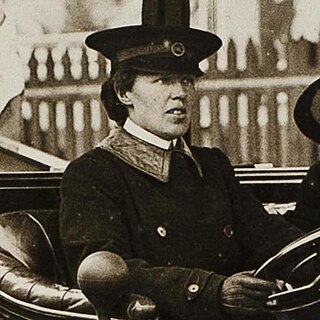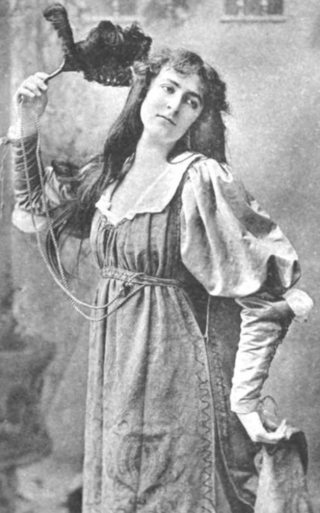
Chesterfield railway station serves the market town of Chesterfield in Derbyshire, England. It lies on the Midland Main Line, which connects Sheffield with London St Pancras. Four tracks pass through the station which has three platforms. It is currently operated by East Midlands Railway.

North East Derbyshire is a constituency created in 1885 represented in the House of Commons of the UK Parliament since 2024 by Louise Jones of the Labour Party.
Sam Hardy was an English footballer who played as a goalkeeper.
Derby is a former United Kingdom Parliamentary constituency. It was a constituency of the House of Commons of the Parliament of England, then of the Parliament of Great Britain from 1707 to 1800 and of the Parliament of the United Kingdom from 1801 to 1950. It was represented by two members of parliament. It was divided into the single-member constituencies of Derby North and Derby South in 1950.

All Saints' Church, Bakewell, is the parish church of Bakewell, Derbyshire, England. It is a Grade I listed building.

Bakewell railway station served the town of Bakewell in Derbyshire, England. It was built by the Midland Railway on its extension of the Manchester, Buxton, Matlock and Midland Junction Railway line from Rowsley to Buxton. The station was closed in 1967. Peak Rail Heritage Railway intends to reopen the station to trains by extending its existing Matlock to Rowsley South line 4 miles through Rowsley to Bakewell.

Henry Hamilton was an English playwright, lyricist and actor. He is best remembered for his musical theatre libretti, including The Duchess of Dantzic (1903), The School Girl (1903), Véronique (1905) and The Little Michus (1907), often adapting foreign works for the British stage.

Cecil Raleigh was the pseudonym of Abraham Cecil Francis Fothergill Rowlands, an English actor and playwright.
Albert Victor Bramble (1884–1963) was an English actor and film director. He began his acting career on the stage. He started acting in films in 1914 and subsequently turned to directing and producing films. He died on 17 May 1963.

Gregory Scott Frances, known professionally as Gregory Scott, was a British film actor of the silent era. He worked for a number of film production companies, most significantly for Neptune Films in the early years of World War I and Broadwest Films during 1916-7 and the post-war years to 1921. Scott featured in mainly dramatic roles playing a variety of characters, including villainous roles.

Pat O'Keeffe, was a professional English boxer who became the British champion in both the welterweight and middleweight weight classes. His professional career spanned the years between 1902 and 1918. In 1914 he made an unsuccessful bid for the European heavyweight belt, losing to Georges Carpentier. Between 1907 and 1910 he left Britain and continued his boxing career in the United States, and then Australia. On the outbreak of World War I he joined the British Army to work as a Physical Training Instructor (PTI) and Recruiting Sergeant for the 1st Surrey Rifles. He won the Lonsdale Belt outright when he defeated Bandsman Blake at the National Sporting Club (N.S.C) on 28 January 1918, becoming British Middleweight Champion.

Margaret Rivers Tragett was a former English badminton player. She competed in the All England Championships from 1902 until 1933 and was the winner of eleven titles. She gained fifteen caps for England and was also editor of the 'Gazette' a popular badminton publication.
Thomas King Lyon was a Scottish footballer who played in the Scottish League for Albion Rovers and Airdrieonians and in the English Football League for Blackpool, Chesterfield and New Brighton. An inside forward, he was on the books of Motherwell without playing for their first team, played junior football for Clydebank Juniors and Yoker Athletic, and played non-league football in England for Prescot Cables.

Vera Louise Holme, also known as Jack Holme, was a British actress and a suffragette. Born in Lancashire, she began working as a touring male impersonator when her parents could no longer support her. A talented violinist and singer, she also was a member of the chorus of the D'Oyly Carte Opera Company and later became a member of the Pioneer Players. After joining the Actresses' Franchise League, she became involved in the women's suffrage movement. She became the Pankhursts' chauffeur and the first professional woman driver in London.

Alice Russon was an Irish actress, singer, and dancer in musical comedies and in silent films.

Eva Elwes was an English actress and playwright who wrote over 50 plays between 1907 and 1938.

Sara Biala was a Polish-born American actress active on Broadway.
The men's fours is one of the events at the annual Bowls England National Championships.

Vera Beringer was a British actress and writer. As a child she became well-known for playing Little Lord Fauntleroy on the London stage. Later she was a playwright, sometimes using the byline Henry Seton.














